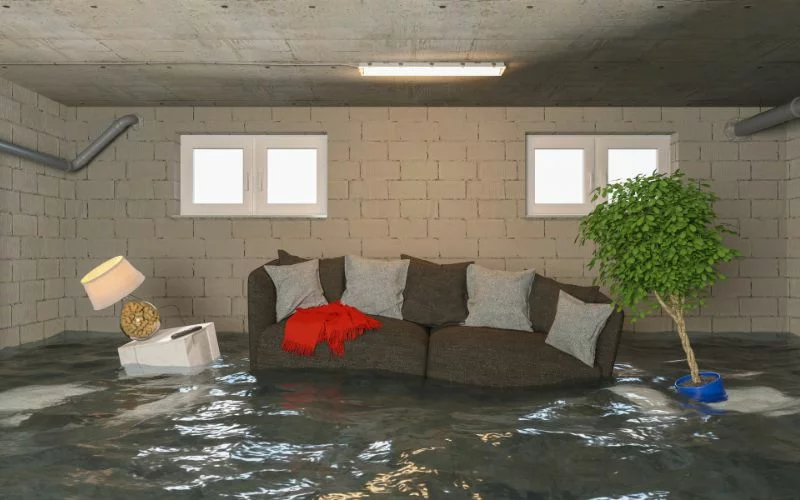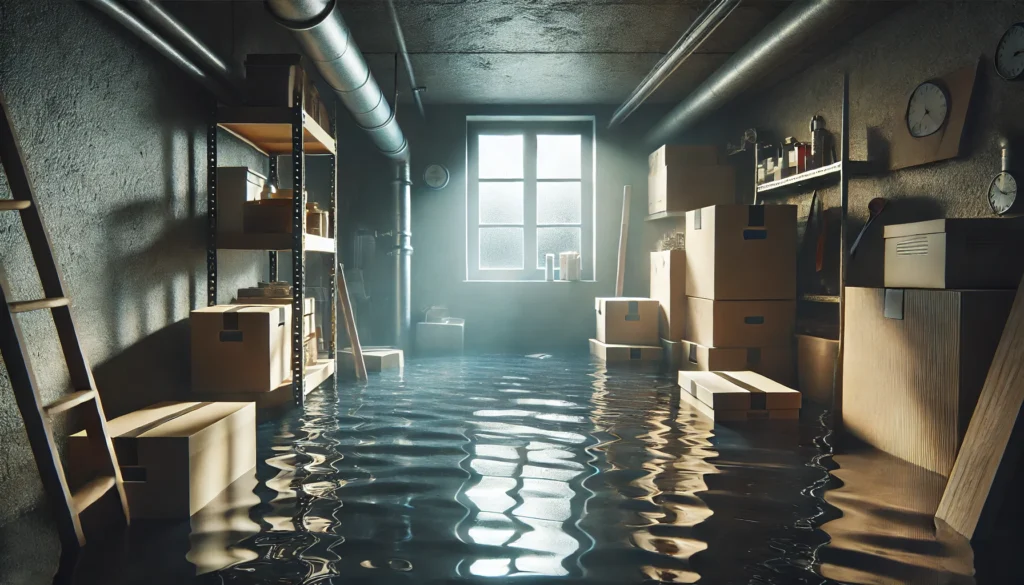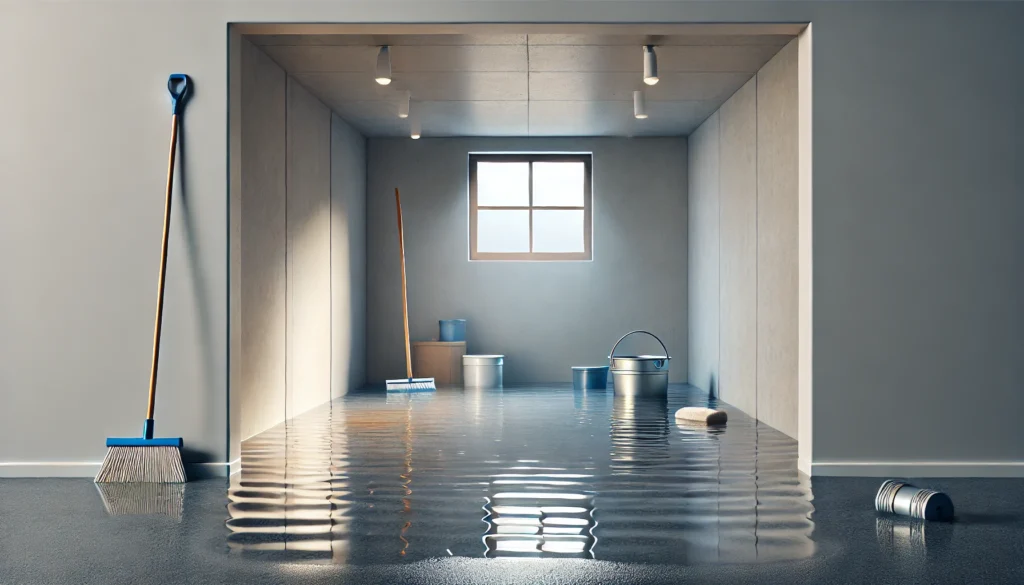Water in Basement? Who to Call and How to Address It

Immediate Steps to Take When You Discover Water in Your Basement
Finding water in your basement can be overwhelming, but taking prompt and strategic action can minimize damage and ensure safety. Here’s what to do:
Assessing the Severity of Water Damage
Before you call a professional, it’s essential to evaluate the situation to understand the scope of the problem:
- Inspect the extent of flooding: Measure the depth of the water and identify the areas affected. A small puddle may indicate a minor issue, while widespread flooding could point to more significant problems.
- Check for structural damage: Look for cracks in walls, buckling floors, or water stains on ceilings, which could signal long-term water exposure.
- Identify the source of water: Determine whether the water is due to a plumbing leak, seepage, or heavy rainfall. This will help you decide whether you need to call a plumber, a contractor, or a water remediation specialist.
- Document the damage: Take photos and notes for insurance purposes, especially if you plan to file a claim for water damage in your basement.
Ensuring Safety: Electricity and Contamination Concerns
Safety should be your top priority when dealing with water in your basement:
- Turn off the power: If water levels are high or have reached electrical outlets, appliances, or wiring, shut off the electricity to your basement. Avoid entering the water, as it may be electrified. If unsure, contact a professional electrician.
- Evaluate water contamination: Determine whether the water is clean (e.g., from a burst pipe) or contaminated (e.g., sewage backup or groundwater). Contaminated water poses health risks and requires specialized cleanup by professionals.
- Ventilate the area: Open windows and doors if possible to improve air circulation and reduce humidity. However, do not use fans or other electrical devices unless the power supply is confirmed safe.
- Wear protective gear: If you need to enter the basement, wear rubber boots, gloves, and a mask to protect yourself from harmful substances in the water or air.
By carefully assessing the severity of the damage and addressing safety concerns, you can take the first steps toward resolving water issues in your basement effectively and efficiently. If you’re unsure about the cause or extent of the problem, contacting a professional such as a plumber or water remediation team is the safest option.
Identifying the Cause of Water in Your Basement
Understanding the root cause of water in your basement is crucial for addressing the issue and preventing future occurrences. Here’s how to pinpoint the source of the problem.
Common Sources of Basement Water
Water can infiltrate your basement due to a variety of reasons. Some of the most common include:
- Poor drainage: Inefficient gutter systems or downspouts that don’t direct water away from your home can lead to water pooling near your foundation.
- Foundation cracks: Over time, cracks in the walls or floors of your basement can allow water to seep in during heavy rains or snowmelt.
- Plumbing leaks: Burst or leaking pipes inside your home can result in localized flooding.
- Sump pump failure: A malfunctioning or overwhelmed sump pump may be unable to handle excess water, leading to flooding.
- High groundwater levels: During periods of heavy rain, water pressure from saturated soil can force moisture into your basement.
- Sewage backup: Blocked or overwhelmed sewer lines can cause contaminated water to back up into your home.
Signs to Help Pinpoint the Cause
Look for the following indicators to identify where the water might be coming from:
- Water stains or damp spots: Stains on walls or floors near cracks or joints often indicate seepage from foundation issues.
- Musty odors or mold growth: Persistent humidity or water intrusion fosters mold, signaling long-term moisture problems.
- Puddles near walls or windows: Water pooling near basement windows or walls can suggest issues with drainage or window well systems.
- Discolored water: Clear water often points to plumbing leaks, while muddy or smelly water could mean groundwater or sewage infiltration.
- Frequent sump pump activation: If your sump pump is running excessively, it might indicate high groundwater levels or drainage issues.
When Professional Help is Necessary
Certain situations require expert intervention to properly diagnose and fix the problem:
- Widespread flooding or recurring water issues: Persistent water intrusion often signals larger structural or drainage concerns.
- Structural damage: Visible cracks, bowing walls, or sinking floors need immediate attention from a contractor or structural engineer.
- Sewage backup: Contaminated water poses serious health risks and should be handled by specialists in sewage remediation.
- Unclear source of water: If you’re unable to identify the cause of water in your basement, consult a waterproofing expert, plumber, or engineer to assess the situation.
Identifying the cause of water in your basement is the first step toward effective remediation and long-term prevention. The sooner you address the issue, the easier it is to protect your home from further damage.
Who to Call for Water in Your Basement

Choosing the right professional to address water in your basement is crucial for effective resolution. Depending on the situation, you may need different experts to assess and fix the problem.
When to Call a Plumber
Plumbers are often the first call for issues related to water in your basement, especially when:
- You suspect a plumbing leak: Burst pipes, faulty water heaters, or leaking fixtures can cause localized flooding.
- There’s a sewage backup: If contaminated water is present, a plumber with expertise in sewage systems is essential.
- Sump pump problems arise: A plumber can repair or replace malfunctioning sump pumps to prevent further flooding.
- Drainage systems are clogged: Blocked drains or pipes leading away from your home can cause water to accumulate in your basement.
In these situations, plumbers can quickly identify and repair water-related issues to prevent further damage.
Role of Water Remediation Specialists
Water remediation specialists focus on cleaning, drying, and restoring your basement after water damage. They are critical in situations where:
- Flooding has occurred: Specialists extract water and use industrial drying equipment to prevent mold growth.
- Mold or mildew is present: These experts are equipped to handle hazardous conditions and restore air quality.
- Contaminated water is involved: If the flooding includes sewage or other hazardous substances, remediation specialists ensure safe cleanup and disposal.
Hiring a water remediation team can significantly reduce health risks and help restore your basement to its original condition.
Structural Engineers vs. General Contractors: Who’s Right for the Job?
When the water problem involves structural damage, it’s essential to call the right professional:
- Structural Engineers
- Best for: Assessing foundational issues, such as cracks, shifting, or bowing walls.
- Expertise: Engineers provide detailed evaluations and plans to address structural problems.
- Why choose them: If your home’s stability is at risk, an engineer ensures repairs are made to code and are safe in the long term.
- General Contractors
- Best for: Repairing cosmetic damage or implementing solutions based on an engineer’s recommendations.
- Expertise: Contractors perform tasks like sealing foundation cracks, improving drainage, and repairing walls or floors.
- Why choose them: Contractors are ideal for executing hands-on repairs and renovations after structural issues are diagnosed.
In complex situations, you may need to work with both a structural engineer and a contractor to ensure comprehensive solutions.
Choosing the Right Expert:
- If you suspect plumbing issues, start with a plumber.
- For water damage restoration and mold concerns, call a remediation specialist.
- When structural issues arise, consult a structural engineer first, then hire a contractor for repairs.
Properly identifying the right professional ensures faster, more effective resolution, preventing further damage and saving you money in the long run.
Can You Remove Water Yourself?

When faced with water in your basement, the first question many homeowners ask is whether they can get water out of basement on their own. While DIY water removal can be effective in certain situations, it’s not always the safest or most efficient option.
DIY Water Removal Techniques
If the amount of water is minimal and the source is not contaminated, you may be able to handle the removal yourself with the following methods:
- Using a Wet/Dry Vacuum: Ideal for small puddles or a shallow layer of water. Ensure the vacuum is rated for wet use to avoid electrical hazards.
- Mops and Buckets: A manual approach for small-scale flooding. Though time-consuming, it’s effective for light water accumulation.
- Deploying Fans and Dehumidifiers: After removing standing water, use fans to promote airflow and dehumidifiers to remove moisture from the air, preventing mold growth.
- Sump Pump Assistance: If you have a working sump pump, it can help clear larger volumes of water efficiently.
- Creating Drainage Paths: For ongoing water seepage, directing the flow toward a drain or outdoor area can prevent further accumulation.
Risks and Challenges of DIY Water Removal
While removing water yourself can save money, it comes with risks and challenges:
- Inadequate Tools and Equipment: Consumer-grade vacuums and fans may not handle significant flooding effectively.
- Mold Growth: Without thorough drying, even small amounts of leftover moisture can lead to mold and mildew issues.
- Electrical Hazards: Water in contact with electrical systems poses a serious safety risk.
- Contaminated Water: Floodwater from sewage backups or natural disasters often contains hazardous substances that require professional handling.
- Structural Damage: If water has compromised your foundation or walls, DIY methods may not address the root cause, leading to recurring problems.
When DIY is Not an Option
There are scenarios where attempting to remove water yourself is impractical or dangerous:
- Significant Flooding: When water levels are too high for household tools to manage effectively.
- Contaminated or Dirty Water: Any water containing sewage, chemicals, or other hazardous materials requires professional cleanup.
- Persistent Water Ingress: If water continues to seep into the basement despite your efforts, a deeper issue like a foundation crack or drainage failure may need addressing.
- Health Concerns: If you or your household members are sensitive to mold, mildew, or contaminants, professional remediation is safer.
- Structural Concerns: Visible damage to walls, flooring, or the foundation indicates the need for expert assessment and repair.
Key Considerations:
- Assess the severity of the water problem before attempting DIY solutions.
- Use professional-grade equipment when possible, or consider renting tools.
- For large-scale flooding or contaminated water, always seek professional help to ensure safety and thorough remediation.
How Professionals Address Basement Water Problems
When basement water issues exceed the scope of DIY solutions, professionals bring specialized expertise and tools to address the problem efficiently and effectively. Different professionals, including plumbers, water remediation teams, and contractors, play specific roles in restoring and safeguarding your basement.
Plumbers: Techniques and Tools They Use
Plumbers are often the first professionals called when water issues arise, especially when they involve leaking pipes or drainage problems. Here’s how they tackle the issue:
- Identifying Leaks: Using advanced tools such as moisture meters and thermal imaging cameras, plumbers can pinpoint hidden leaks behind walls or under floors.
- Fixing Faulty Plumbing: Repairing or replacing burst pipes, malfunctioning sump pumps, or clogged drains to stop the immediate source of water intrusion.
- Installing Backup Systems: Setting up systems like backup sump pumps or water alarms to prevent future flooding incidents.
- Drainage Solutions: Clearing blocked sewer lines or installing new drainage systems to ensure water flows away from your basement.
Water Remediation Teams: Drying and Restoring Your Basement
Water remediation specialists focus on removing water, drying out affected areas, and preventing secondary damage such as mold growth. Their process typically includes:
- Water Extraction: Using high-powered pumps and vacuums to remove standing water quickly, especially in cases of deep flooding.
- Dehumidification and Airflow: Employing industrial-grade dehumidifiers and air movers to thoroughly dry the space, minimizing the risk of mold and mildew.
- Sanitization: Cleaning and disinfecting surfaces to remove contaminants, especially if the water was dirty or sewage-laden.
- Moisture Monitoring: Continuously monitoring humidity levels to ensure the basement is completely dry before restoration begins.
Contractors’ Role in Long-term Repairs and Waterproofing
Once the immediate water issue is addressed, contractors step in to repair damage and implement long-term solutions to prevent future problems. Their services include:
- Foundation Repairs: Fixing cracks or structural weaknesses that allow water intrusion.
- Basement Waterproofing: Installing systems like French drains, exterior waterproof coatings, or interior sealants to create a moisture barrier.
- Drainage Improvements: Designing and installing landscape grading, gutters, and downspouts to divert water away from the house.
- Floor and Wall Restoration: Replacing or repairing water-damaged flooring, drywall, and insulation to restore the basement to its original condition.
Key Takeaways:
- Plumbers address immediate issues like leaks and faulty systems.
- Water remediation teams handle cleanup, drying, and mold prevention.
- Contractors focus on structural repairs and long-term waterproofing solutions.
By combining their expertise, these professionals ensure your basement is not only restored but also protected against future water problems. Let me know if you need further details or adjustments!
Preventing Future Basement Water Issues
Essential Waterproofing Methods
Preventing water in your basement starts with robust waterproofing techniques. Key methods include:
- Sealing Cracks and Gaps: Apply waterproof sealants to cracks in walls and floors to block water entry.
- Installing Sump Pumps: A sump pump effectively removes water accumulating in the basement, particularly in areas prone to flooding.
- Adding a Moisture Barrier: Use vapor barriers or waterproof coatings on walls to reduce moisture penetration.
- Upgrading Drainage Systems: Ensure that gutters, downspouts, and French drains direct water away from your home’s foundation.
Regular Maintenance Tips for a Dry Basement
Maintenance plays a critical role in preventing water damage. Incorporate these practices:
- Inspect Gutters and Downspouts: Clean them regularly to ensure proper water flow away from your home.
- Check for Foundation Cracks: Conduct periodic inspections and repair any cracks promptly.
- Test Your Sump Pump: Ensure it’s functional, especially before rainy seasons.
- Maintain Landscaping: Grade the soil around your home to slope away from the foundation.
Warning Signs to Watch for Before Major Issues Arise
Spotting early signs of water issues can prevent costly repairs. Keep an eye out for:
- Damp or Musty Smells: Persistent odors may indicate hidden moisture.
- Peeling Paint or Efflorescence: White, powdery deposits or peeling paint on walls can signal water intrusion.
- Pooling Water Near Foundation: Puddles around your home could lead to basement leaks.
- Mold or Mildew Growth: Visible mold is often a sign of ongoing water issues.
By implementing these strategies and staying vigilant for warning signs, you can keep your basement dry and safe while avoiding major water-related problems.
Conclusion
When dealing with water in the basement, addressing the issue promptly is key to protecting your home from further damage. Whether it’s fixing leaks, improving drainage, or investing in professional help, taking the right steps ensures that your basement remains dry and your home stays safe.






